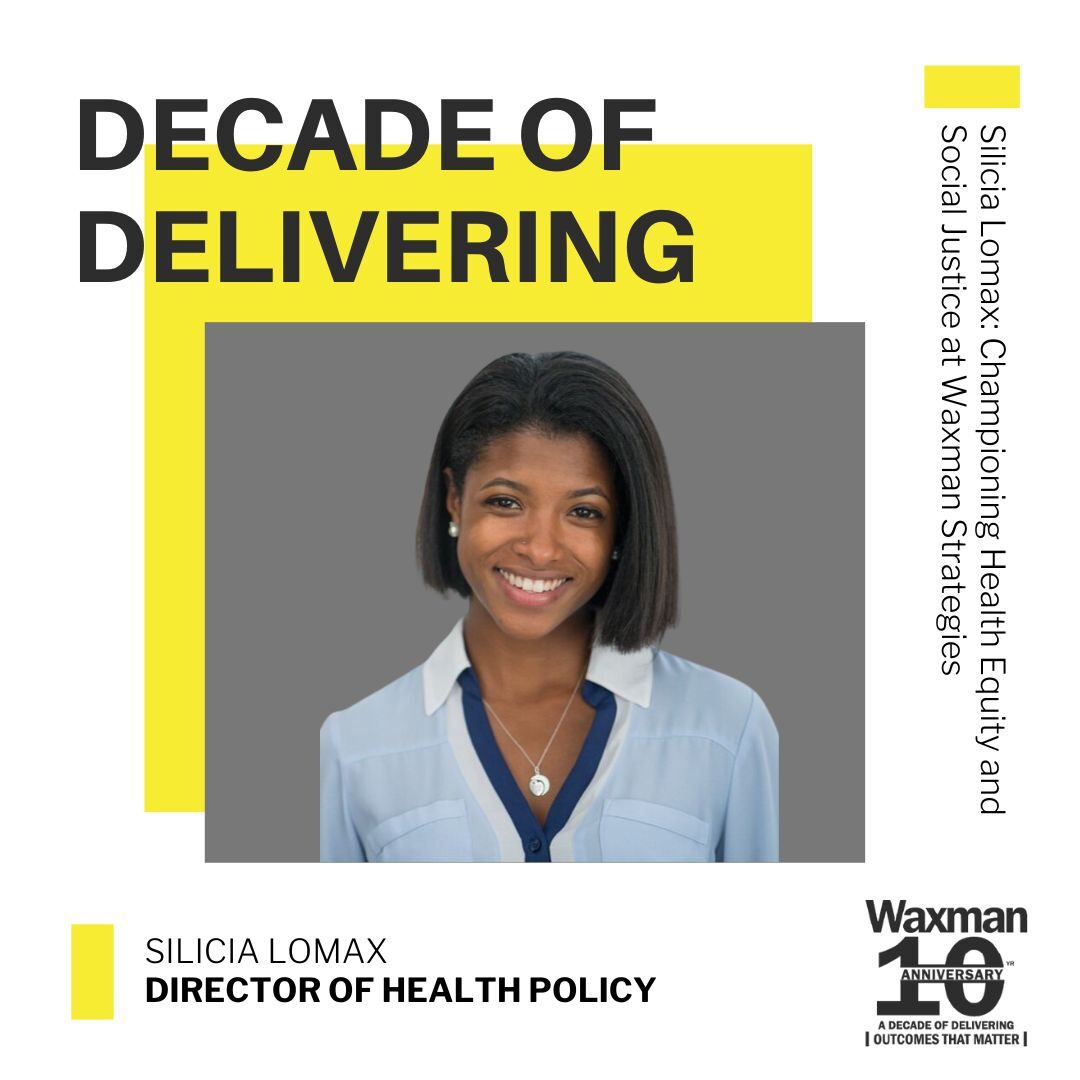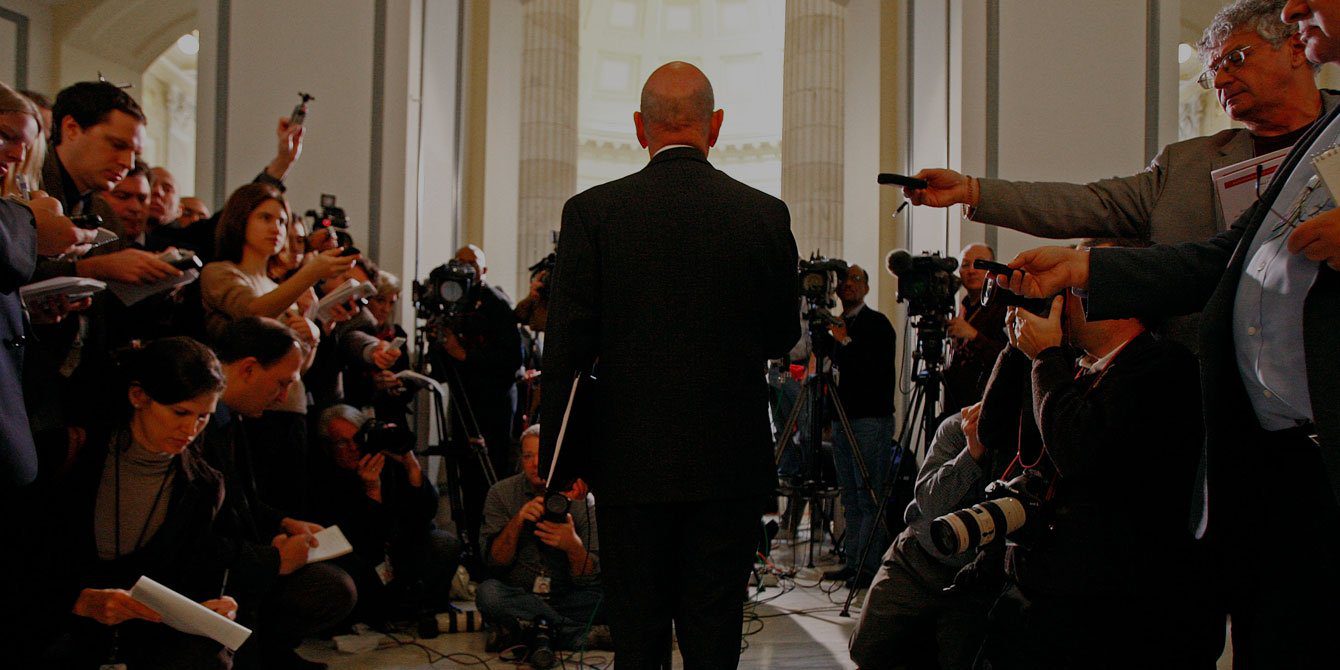Silicia Lomax: Championing Health Equity And Social Justice At Waxman

On September 21, 2020, the Waxman Strategies family welcomed a dedicated and passionate advocate into its fold—Silicia Lomax. As the Director of Health Policy, Silicia embarked on a transformative journey that has since contributed immensely to the organization’s mission of driving positive change through policy and advocacy.
As we continue to celebrate a Decade of Delivering outcomes that matter, we have the privilege of introducing you to Silicia Lomax and her inspiring journey within the Waxman Strategies team. Her story exemplifies the unwavering commitment to health equity and social justice that defines the spirit of Waxman Strategies. Join us as we delve into her incredible journey and the vital role she plays in shaping a brighter future.
Q: What inspired you to pursue a career at Waxman, and what do you enjoy most about working here?
A: For as long as I can remember, I’ve always been a person who cares about health equity. It was primarily due to racial disparities in healthcare quality and access that I learned about and witnessed throughout my formative years. Still, I needed to figure out how to make a positive difference for people. However, through some of my classes and advocacy participation during my MPH program, I learned that health policy was one of the greatest ways to impact a broad population, especially when those policies have equity at their center.
I then learned about Waxman Strategies and realized that it could be a wonderful place to work, given how much it aligns with my goals and priorities and because of the accomplishments of the people at the firm. Honestly, it was such an inspiration seeing the type of people that work at Waxman, starting with, of course, Henry Waxman, who was at the helm of one of the biggest public health fights in our history with big tobacco companies and later helped to produce the Affordable Care Act. Then there are also people like Bill Corr, a leader at HHS, and Jeremy Sharp, a leader for FDA, and more people who have been advocates for some of the same issues I care about, and it feels like a no-brainer.
As far as what I enjoy most about working at Waxman, it is indeed the team that I get to work with. I’ve been fortunate to have a fantastic team of incredibly smart, dedicated, flexible, and understanding people.
Q: What are your primary responsibilities at the firm, and how do they align with your professional goals?
A: My primary responsibilities as a director in our health practice fall into a few specific buckets:
- Strategic counsel and advocacy for the various clients that we work with.
- Policy research and analysis.
- Project management to ensure that we stay on track.
All of those responsibilities align with my professional goals as I continue supporting opportunities to improve the health and well-being of our communities through policy.
I also have a bonus responsibility to center DEIJ values in all our work. This is through a combination of our collaborative DEIJ committee to review our internal processes better to reflect our values and through strategic counsel with clients so that they understand the importance of the specific issue and how that issue can impact different people directly.
Q: What has been your biggest achievement or proudest moment while working at Waxman, and how did you contribute to its success?
A: One achievement immediately comes to mind is the role our team from Waxman was able to play in supporting the successful White House Conference on Hunger, Nutrition, and Health held in September 2022. This was based on long-standing work we were doing with the Tufts Friedman School of Nutrition Science and Policy. I had been working with the Friedman school since I joined the Waxman team, and one of the biggest goals that Tufts had was to advocate for a second White House conference on nutrition, hunger, and health to think critically about ways we can improve nutrition within the US. It took our team, working with Tufts and many other partners, over two years of meeting with people in the administration, including staff at the White House Domestic Policy Council, USDA, HHS, and FDA, and meetings with members of Congress and their staff, to get momentum behind it. I was empowered to schedule and lead several of those meetings. One of my most significant accomplishments was underscoring the importance of having farmers and people with lived experience of food insecurity at the White House conference in addition to the leaders in this space. The officials who led the conference listened to and agreed with that feedback to make it happen. On behalf of the Friedman School, the Waxman team facilitated a coalition of over one hundred different organizations, including academics, think tanks, and nonprofit organizations, to focus on the issue’s importance and to lay out the rationale for a White House Conference. Once September 2022 arrived, it was surreal to see the White House Conference come to fruition with President Biden’s opening remarks on this critical issue. And even better was seeing the national strategy and immediate policy changes that came out of that conference to improve food and nutrition security in the country.
Another achievement is the work that we’ve been able to do with the Health and Reentry Project. This started as an idea from John Sawyer at Waxman and Vikki Wachino, a former leader at the Centers for Medicare and Medicaid Services (CMS) and longtime Medicaid expert and advocate. The Health and Reentry Project is an initiative that advances policy and practice to improve access and continuity of care for people leaving incarceration and returning to their communities. Before my time at Waxman, I did some advocacy work related to improving mental health for people in correctional facilities in Pennsylvania, so this felt like a fitting continuation of that kind of work on a federal and state policy level. Through numerous interviews, meetings with administration officials, convenings, and written products, HARP’s work has become a key source of information for CMS and other federal agencies, state leaders, local leaders and advocates, positively impacting the considerations made in policy development. Our published work was even cited within the national guidance to states released by CMS in April 2023, which was so validating to see the impact of our work on policy changes! The Health and Reentry Project was recently established as a nonprofit organization and Waxman will continue to play a central role as HARP takes on multiple new, long-term projects.
Q: What is your approach to leadership, and how do you inspire and motivate others on your team?
A: My approach to leadership remains in a spirit of collaboration that uses everyone’s strengths effectively. Bringing in people with different backgrounds and expertise helps address issues that I likely would not have considered on my own and makes the solutions or policies even stronger. I enjoy bringing people together in more casual settings because it helps me learn about what has influenced them on their journeys and better understand what a person hopes to accomplish from a deeper level.
My approach to leadership is about remaining curious and coming to each discussion without assuming that my position or approach is automatically correct. Sometimes, taking that time to acknowledge my own blind spots on issues is key to making progress with unlikely allies and motivates others on the team to stay curious and ask questions, too.
Q: What have been some of the biggest challenges you’ve faced in your career, and how have you overcome them?
A: One lesson I’ve learned, and simultaneously the biggest challenge, is that uncertainty is inevitable. As a person who enjoys being in control and ensuring that I can keep projects and deliverables on a timeline, there have been moments when the world and the slow progression of policies have not always aligned with my plans. So, being able to pivot and adapt is essential, and sometimes, having a Plan B or even a Plan C helps us to be prepared under different circumstances to get better outcomes.
Another challenge I’m still trying to overcome but still essential to recognize is that doing positive, impactful work is complex and not for the faint of heart. Some will say it’s too costly or complicated to make specific changes, but that doesn’t mean we should automatically give up. It has taught me that you have to be resilient, you have to be innovative, and sometimes you have to be willing to go outside of the status quo to improve people’s quality of life.

